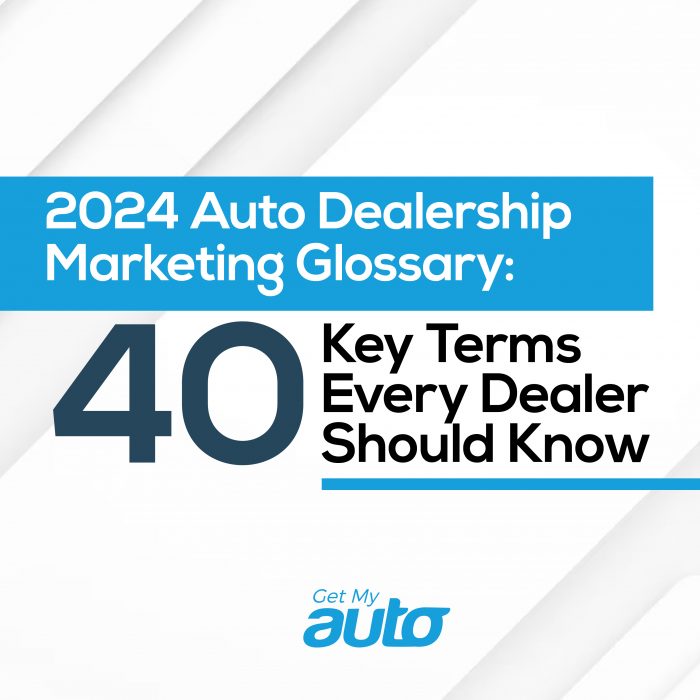In 2024, navigating the complex and ever-evolving landscape of car dealership marketing and advertising is critical for any dealer aiming for success. The integration of advanced digital innovations with traditional marketing tactics is increasingly indispensable in the realms of dealer marketing and dealer advertising. This detailed and comprehensive glossary is specifically designed to be an essential guide, highlighting the latest trends and terminologies in automotive dealer marketing and advertising. It is a vital resource for dealerships striving to boost their marketing and advertising effectiveness, ensuring they stay ahead in the highly competitive industry. By embracing these insights, dealers can significantly enhance their ability to successfully maneuver through the intricate world of automotive marketing, paving the way for increased success and market dominance in 2024.
Glossary of Marketing Terms for Auto Dealers
1. Audience Segmentation: Categorizing potential customers based on demographics, behavior, and other traits to target marketing more precisely.
2. Brand Awareness: The degree to which consumers recognize and understand the unique aspects of a car brand or dealership.
3. Conversion Rate: The ratio of website or showroom visitors who end up making a purchase.
4. Digital Showroom: An online space mimicking a physical dealership, enabling customers to view and customize vehicles digitally.
5. Electric Vehicle (EV) Marketing: Strategies focused on promoting EVs, emphasizing eco-friendliness and technological innovation.
6. FinTech Integration: Utilizing financial technology in marketing to simplify financing options like online loans.
7. Geo-Fencing: Sending targeted ads to consumers’ smartphones when they enter a specific geographic zone, like near a dealership.
8. Hybrid Sales Model: Combining online and offline sales methods to cater to customer preferences for both digital and physical experiences.
9. Influencer Partnership: Teaming with social media influencers or local celebrities to endorse dealerships or car models.
10. Journey Mapping: Charting customer interactions from learning about a car to the actual purchase.
11. KPIs (Key Performance Indicators): Metrics for assessing the effectiveness of marketing campaigns, including sales and website traffic.
12. Lead Nurturing: Building relationships with potential buyers throughout their purchasing journey.
13. Mobile Optimization: Ensuring dealership websites and online content are fully functional on mobile devices.
14. Neuro-Marketing: Applying neuroscience to understand and influence consumer behavior in marketing.
15. Omnichannel Marketing: A multi-platform sales approach offering a seamless shopping experience across devices and physical stores.
16. Personalization: Customizing marketing messages and offers to individual consumer preferences and behaviors.
17. QR Code Promotions: Using QR codes in marketing to easily access information and offers.
18. Reputation Management: Strategies to enhance the public image of a dealership, managing online reviews and feedback.
19. Sustainability Marketing: Highlighting eco-friendly practices and vehicles to appeal to environmentally conscious consumers.
20. Test Drive Experiences: Making test drives more convenient and immersive, like offering at-home trials or VR simulations.
21. User-Generated Content (UGC): Leveraging content created by consumers to build trust and authenticity.
22. Vehicle Customization Tools: Online platforms enable customers to tailor their car’s features and design before purchase.
23. Webrooming: Researching cars online before visiting a dealership for purchase.
24. Xenial Marketing: Creating a friendly and welcoming atmosphere in marketing to attract diverse customers.
25. Yield Management: Adjusting prices in real-time based on demand is crucial in the variable car sales market.
26. Zero Moment of Truth (ZMOT): The moment a consumer researches a product online, underscoring the need for a robust online dealership presence.
27. Dealer CRM (Customer Relationship Management): A system for managing all your dealership’s interactions with current and potential customers, centralizing data to enhance customer service and sales strategies.
28. Content Marketing: Creating and sharing valuable content to attract and engage your audience, building brand awareness and loyalty.
29. Retargeting Ads: Online ad campaigns targeting users who have previously interacted with your website or social media, encouraging them to return.
30. SEO (Search Engine Optimization): Optimizing your website and online content to rank higher in search engine results, making it easier for potential customers to find your dealership.
31. Local SEO (Search Engine Optimization): This refers to optimizing a car dealership’s online presence to appear in local search results. It involves tactics such as updating the dealership’s Google My Business listing, ensuring NAP (Name, Address, Phone Number) consistency across the web, using local keywords (like city or neighborhood names), and garnering local reviews. Effective Local SEO helps potential customers in the dealership’s vicinity find it easily when they search for vehicles or auto services online.
32. Craigslist Marketing: Craigslist, a popular classifieds website, offers a platform for car dealerships to list their inventory. Marketing on Craigslist involves posting attractive and detailed ads for each vehicle, including high-quality images, comprehensive vehicle information, and competitive pricing. Dealerships often use this platform to reach a local audience, offering special promotions, highlighting unique vehicle features, and providing clear contact information to drive traffic to their website or physical dealership.
33. Google Feed (formerly known as Google Shopping): For car dealerships, Google Feed can be a valuable tool to showcase their inventory in Google’s search results. This service allows dealerships to upload a feed of their car inventory, including details like make, model, price, and images. When potential customers search for specific vehicle types or models on Google, the relevant listings from the dealership’s feed can appear in the search results, often with a picture and price, leading to increased visibility and potential leads. Google Feed requires maintaining up-to-date inventory information and adhering to Google’s advertising policies specific to the automotive sector.
34. Social Media Marketing: Using platforms like Facebook, Instagram, and Twitter to promote your dealership, engage with customers, and build your brand.
35. Video Marketing: Leveraging video content to showcase vehicles, customer testimonials, and dealership features, enhancing engagement and reach.
36. Email Marketing: Sending targeted emails to segmented lists of customers and prospects, keeping them informed and engaged with your dealership.
37. SMS Marketing for Car Dealerships: SMS (Short Message Service) Marketing refers to sending promotional or transactional messages using text messages for marketing purposes. These messages are typically meant to communicate offers, updates, and alerts to customers who have consented to receive these messages from the car dealership.
38. Customer Retention Strategies: This term refers to the methods and practices used by car dealerships to maintain relationships with existing customers and encourage repeat business. It can include loyalty programs, personalized follow-ups, service and maintenance offers, or exclusive discounts for existing customers. Effective customer retention strategies boost sales, help build a loyal customer base, and enhance the dealership’s reputation.
39. Behavioral Targeting: Behavioral targeting in car dealership marketing involves analyzing customer data such as past purchases, browsing history, and search queries to deliver personalized marketing messages. For instance, if a customer has been browsing SUVs on the dealership’s website, targeted emails or ads about SUV models and offers could be sent to that customer. This approach increases the relevance of the marketing efforts, potentially leading to higher engagement and conversion rates.
40. Virtual Reality (VR) Showcasing: VR showcasing involves using virtual reality technology to provide customers with an immersive vehicle experience without them having to visit the dealership physically, including virtual test drives, 360-degree interior and exterior views, and interactive model exploration. VR showcasing is particularly useful for engaging customers in the early stages of the buying process, providing them with a unique and informative experience that can influence their purchase decisions.
This expansive 40-term glossary meticulously encompasses a diverse range of marketing concepts, each significantly contributing to the dynamic and evolving field of car dealership marketing in 2024. It delves into various aspects, from the intricacies of digital marketing tools such as Dealer CRM, essential for customer relationship management and sales tracking, to the nuances of sustainable and xenial marketing, which emphasize eco-friendly practices and create a welcoming atmosphere for a diverse clientele. Collectively, these terms offer a deep and foundational understanding, crucial for any car dealer who aspires to excel in the increasingly competitive and technologically driven market. Understanding and implementing these strategies can be a game-changer, providing dealers with the necessary tools and knowledge to navigate the complex landscape of modern automotive marketing effectively and to stand out in a crowded marketplace. This glossary serves as more than just a reference; it’s a roadmap for success for car dealerships adapting to the ever-changing marketing trends of 2024.
Sell More Cars: Drive Your Dealership Forward with GetMyAuto
Transform your car dealership’s marketing strategy and sales performance with the expert solutions at Get My Auto. We offer specialized services like Craigslist posting & marketing to enhance your local presence, Facebook advertising and social media re-marketing campaigns for wider audience engagement and powerful but easy-to-use dealer CRM to optimize customer relations. Our auto dealer inventory management software, DMS+, integrates with our marketing CRM and other marketing solutions that further streamline your daily operations, ensuring efficiency and integration. Take the first step towards revolutionizing your dealership’s success. Contact Get My Auto now to schedule a demo and explore how our cutting-edge marketing products and solutions are uniquely designed for the evolving needs of auto dealers. Your journey to higher sales and impactful marketing begins here.


